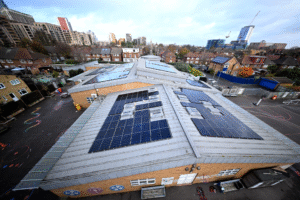An innovative project will see electricity from non-recyclable waste power a £65m plastic recycling plant in Bristol.
Pennon Group, parent company of Viridor, the UK’s biggest recycling company, announced the project last week which will be built next to their existing facility at Avonmouth.
In its first year, the plant will produce 60,000 tonnes of recycled plastic a year from 1.6 billion bottles, pots, tubs and trays, which will be powered by diverting 320,000 tonnes of waste from landfill and generating 32MW of electricity, the equivalent energy used to power around 44,000 homes.
Recycled plastic uses 50% less electricity than virgin plastic and sourcing power from non-recyclable waste makes the site the ‘UK’s first’ circular economy waste park.
Pennon’s chief executive officer Chris Loughlin said: ‘Pennon is dedicated to working in ever-more sustainable ways and we are extremely excited to be announcing this first-of-its-kind investment in plastics recycling. By using waste which cannot be recycled as the fuel to create low carbon electricity which will power plastics recycling we are creating a truly resource and energy-efficient waste management solution.”
‘There is a clear ambition from both UK consumers and politicians to improve recycling rates and reduce the amount of waste which is sent to export. Our research shows that 80% of people believe the UK should find a way to deal with its own recycling without having to ship it to other countries.’
‘Unless action is taken now and investment in infrastructure is made, a plastic recycling capacity gap will undermine UK ambitions and the sustainability targets of retailers and the big consumer brands. We are, therefore, delighted to be leading the way.’
Sarah Heald, Pennon’s director of corporate affairs and investor relations added: ‘This is an extremely important investment for the South West. It will create a centre of excellence for UK recycling right here in the region, showcasing leading-edge innovation and technology, and bringing knock-on benefits to the regional economy.
‘As one of the South West’s largest private sector investors and employers we are delighted to be able to invest in a South West recycling powerhouse which will significantly reduce the amount of plastic sent to landfill and help to protect the environment.’















